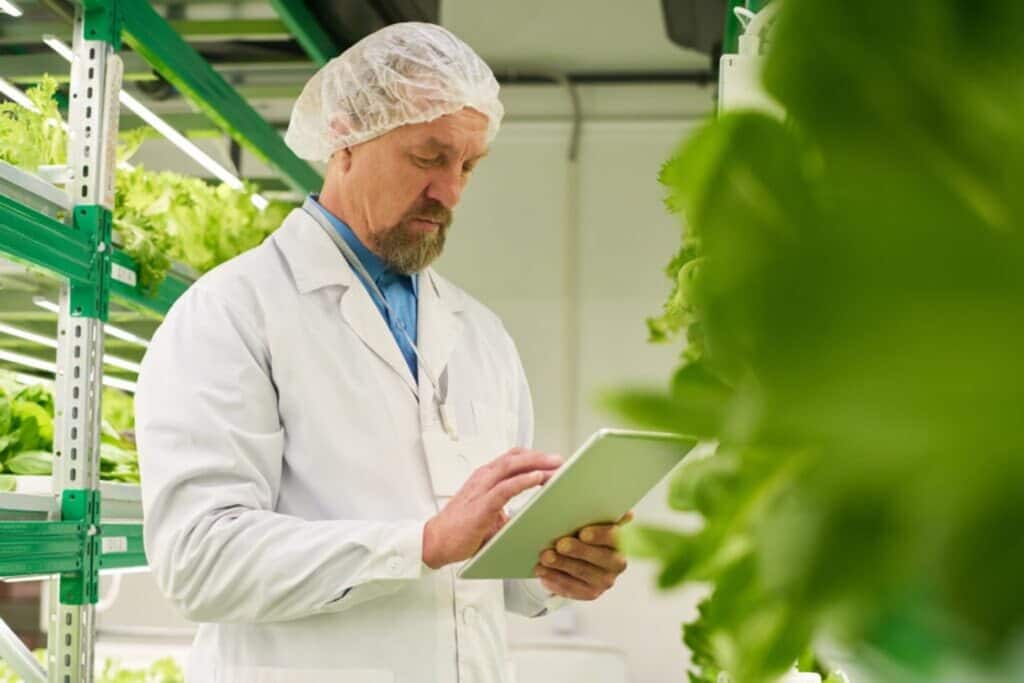The food industry is a vital sector of the global economy, responsible for producing, processing and distributing the food that feeds billions of people every day. With changing consumer preferences, stringent food safety regulations and growing sustainability pressures, food companies face complex challenges in maintaining their competitiveness while meeting market demands.

Computerised Maintenance Management Systems (CMMS) offer an essential solution for the food industry in its quest for competitiveness and compliance with standards. A CMMS is much more than a simple maintenance tool; it is an integrated system that optimises the management of equipment, resources and production processes.
Evolution of the Food Industry : Trends, Technologies and Social Responsibility
The constant advance of technology means that it is becoming more and more essential to our daily lives and to brands’ business strategies. Despite the uncertainty, this is a time of opportunity for growth in all areas of food and drink.
However, challenges such as raw material shortages and inflation are driving up operating costs, resulting in higher retail prices for consumers. Brands are recognising the importance of managing these issues to preserve their reputation. According to IDC’s ‘Global Food and Beverage Industry Trends and Strategic Insights 2022‘ white paper, inflation and rising operating costs are major concerns for food and beverage industry executives, with potential repercussions over the next 5 years.
CMMS has become a fundamental pillar in the industrial sector, offering a methodical and automated approach to equipment maintenance. In times of continuous technological progress, its usefulness is even more crucial, both in solving operational challenges and in innovation.
- Food trends and product diversification :
Consumer food preferences are constantly evolving, leading to a diversification of food products available on the market. CMMS respond to this trend by guaranteeing the quality, freshness and safety of foodstuffs throughout their production cycle, helping to meet the growing demand for organic, local and environmentally-friendly food.
- Technology and innovation :
Technological advances such as IoT, AI and blockchain are revolutionising the food industry by improving product quality, traceability and sustainability. CMMS integrates with these technologies to optimise food manufacturing and distribution processes, ensuring high standards of quality and food safety.
- Sustainability and social responsibility :
The food industry is increasingly committed to adopting sustainable practices, including reducing food waste and promoting sustainable agriculture. CMMS supports these initiatives by optimising the use of resources and minimising the environmental impact of maintenance and production operations.
- Global supply chain :
The growing complexity of the food supply chain requires rigorous management and increased traceability. CMMS offers a centralised solution for supervising and coordinating maintenance operations on a global scale, ensuring compliance with food quality and safety standards throughout the chain.
- New distribution models :
The emergence of new food distribution models, such as meal delivery platforms and cashless shops, demands greater operational efficiency. CMMS optimise logistics and distribution processes, enabling food businesses to adapt to new consumer buying habits while maintaining high standards of quality and safety.
BRC and CMMS : Alliance for Food Safety
Created and published for the first time in 1998, the BRC (Global Standard for Food Safety) is now in version 7. It defines the safety, quality and production criteria required within a food production company to meet its obligations in terms of compliance with legislation and consumer protection. Compliance with these rigorous standards requires precise and efficient management of operations, which makes the use of Computer-Aided Maintenance Management (CMMS) particularly relevant.
CMMS play a crucial role in meeting BRC standards by enabling proactive maintenance of production equipment and facilities. By planning and carrying out preventive maintenance operations in line with BRC requirements, food companies can minimise the risk of contamination and equipment failure, ensuring product safety throughout the manufacturing process.

In addition, CMMS facilitate the management of maintenance-related data and documents, which is essential for demonstrating compliance with BRC standards during audits and inspections. By keeping an accurate record of maintenance activities, the work carried out and the spare parts used, CMMS enhances product traceability and process transparency, key elements in meeting the requirements of the standard.
By integrating Altair CMMS into their management practices, food companies can not only improve their compliance with BRC standards, but also optimise their maintenance operations, thereby reducing unplanned downtime, increasing productivity and guaranteeing product quality and safety. Ultimately, the use of CMMS is proving to be an essential investment for companies seeking to achieve and maintain the highest standards of food safety and quality, in line with the requirements of the BRC standard.
Advantages of CMMS in the food industry
Monitoring regulatory compliance
In the food industry, compliance with safety and quality standards is essential. CMMS enables maintenance activities to be documented and tracked, making it easier to demonstrate regulatory compliance during audits and inspections.
Supply chain management
CMMS can be used to monitor and manage food production and distribution processes throughout the supply chain. By identifying bottlenecks and optimising workflows, CMMS help to reduce delays and waste while improving product traceability.
Impact of CMMS on operational efficiency
Reduced maintenance costs
By preventing breakdowns and optimising maintenance processes, CMMS contribute to reduce the cost of repairing and replacing equipment. This translates into significant long-term savings for food companies.
Increased productivity
By minimising unplanned downtime and optimising equipment performance, CMMS help to boost the productivity of production lines and food distribution centres. This enables companies to respond more effectively to market demand and remain competitive.

Conclusion
In short, CMMS are proving to be an essential pillar in the optimisation of food production and distribution processes. By guaranteeing equipment availability, optimising performance and reducing maintenance costs, it offers companies the means to maintain their competitiveness in an ever-changing market.
By effectively integrating CMMS into their operations, companies can not only improve their operational efficiency, but also guarantee the safety and quality of the food products they offer to their customers, thereby consolidating their reputation and market position.
With the increasing adoption of sustainable practices and the need to meet consumer expectations in terms of transparency and authenticity, CMMS are becoming an essential tool for ensuring compliance with standards, product traceability and respect for commitments in terms of social and environmental responsibility.
By investing in a CMMS, food businesses can not only optimise their current operations, but also prepare for future challenges and seize opportunities for growth in a constantly evolving sector.
For more information on our solutions, visit our websites: DSD System & Altair Entreprise



